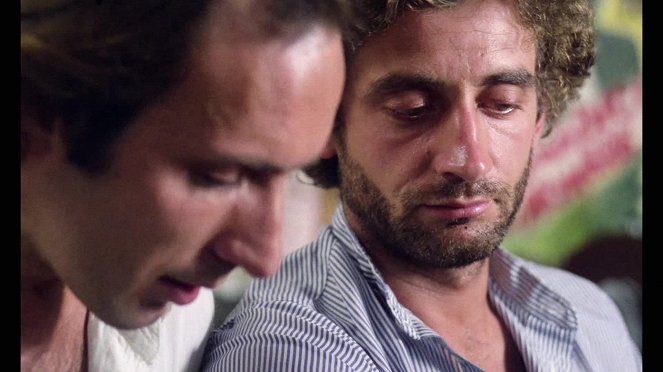Directed by:
Iván ZuluetaScreenplay:
Iván ZuluetaCinematography:
Ángel Luis FernándezComposer:
Iván ZuluetaCast:
Eusebio Poncela, Cecilia Roth, Will More, Pedro Almodóvar, Luis Ciges, Marta Fernández Muro, AlaskaPlots(1)
Horror movie director José (Eusebio Poncela) is adrift in a sea of doubt and drugs. As his belated second feature nears completion, his reclusive bubble is popped by two events: a sudden reappearance from an ex-girlfriend and a package from past acquaintance Pedro (Will More): a reel of Super-8 film, an audiotape, and a door key. From there, the boundaries of time, space, and sexuality are erased as José is once more sucked into Pedro’s vampiric orbit. Together, they attempt the ultimate hallucinogenic catharsis through a moebius strip of filming and being filmed. (Radiance Films)
(more)Videos (1)
Reviews (2)
The Spanish production Rapture is not an easy movie to watch. It is not a straightforward movie However, it has a great atmosphere, both in a purely depressing and horror way, which is not only created by the acting performances and the story itself, but also by the movie's color palette, and the slightly low-budget camera work. This is one of those cases where the fact it is a low-budget movie does not matter at all that It is because it seems appropriate. It is just too bad about Ivan Zulueta’s talents.
()
Even though Rapture did not enjoy a long run in Spanish cinemas and none of the major festivals showed any interest in it, it achieved cult status and became an emblematic work of the Madrid Scene. It is a film made by people with no idea how to make films and how much they cost. Despite that, it looks much more professional and less cheap than anything by Almódovar in the early stages of his career (or rather, the trash aesthetic wasn’t the only possibility for underground Spanish filmmakers). Like other cult movies, Rapture loses a key part of its appeal in an era when even the most obscure cinematic work is generally easily available. Despite that, however, this unconventional vampire flick about the enthralling power of vivid images and other related elements manages to engage even the uninitiated viewer who didn’t have to wait many years to see THIS film. The motif of returning to the past, which was very popular in post-Francoist cinema, was given an extremely subjectivised form here. Though it is somewhat unbearable (someone is always talking in the picture), it disturbingly points out the ease with which earlier events can be rewritten. Whereas José’s flashbacks show what happened, his friend’s recorded commentary in the present puts things in context and connects the present with the past. The protagonist is offered the possibility that makes films so seductive – the possibility to partially take on someone else’s perspective. At the same time, films – together with drugs – multiply the protagonist’s experience of reality. He sees and feels more, he touches immortality, but he is distanced from real human existence. The powerful climax, with a bittersweet reward for José and for viewers eager for the fulfilment of genre conventions, expresses the ambivalent position of Spanish artists, who, with the abolition of censorship (1977), gained unrestricted freedom, the consequences of which were often devastating for them. Abundantly fed with avant-garde currents, Rapture does not offer a manual on how not to drown in the open cinematic sea. However, the fact that the film was finished and that it can enthral the viewer despite its narrative emptiness and sluggishness can be taken as proof that even the non-swimmers – the more foolish and crazier ones – can quickly learned to swim. 75%
()
Gallery (18)



Ads